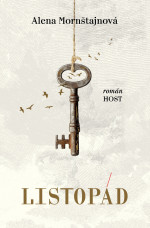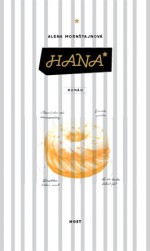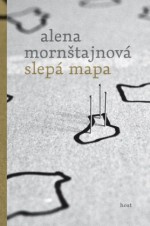Alena Mornštajnová’s first novel, the family saga Slepá mapa (Blind Map) from 2013, presents three generations of women (Anna, Alžběta, Anežka – the narrator) and, as is common in Mornštajnová’s work, shows how the characters’ lives are transformed and shaped by external upheavals and traumas which they are powerless to influence. It was in this novel that Mornštajnová introduced and, at the same time, fully developed her ability to present a broad historical period (the entire 20th century) and the lives of temperamentally different characters. The sweeping narrative unfolds from the time of the First World War, when the grandmother Anna moves home with her partner Antonín to the north Bohemian border, where they struggle to survive (Antonín was wounded at the front, Anna has tuberculosis). The story of their daughter Alžběta and granddaughter Anežka is similarly dramatic and bleak: Alžběta flees the border from the occupying German army and loses her home, and then an officer from the Communist Secret Police interferes in Anežka’s life. The protagonists are always at the centre of Mornštajnová’s attention and the greatest space is given to their characterization and psychological development, thanks to which they become fully rounded, believable characters.
The novel Hotýlek (The Little Hotel), which has also been reprinted, describes the First Republic hourly hotel of Mr Leopold, which remains an island of delights even after it has been nationalized, while the moments of physical pleasure enjoyed by the dignitaries are in contrast to the troubles of the private owner, and later of the hotel managers, over four generations. This novel also operates within the framework of a saga covering the whole of the 20th century and also presents a large number of characters with generational ties (almost 20 people). However, the focus is on Václav Mánes, Leopold’s grandson, who the reader learns about retrospectively as the opening scene starts with his funeral. However, even in those novels which have a central male character, Mornštajnová develops in detail the more minor female roles.
Hotýlek also demonstrated Alena Mornštajnová’s exceptional talent as a narrator. “In her writing Mornštajnová is very drawn towards describing our country’s past. She is interested in the lives of ordinary people during the war and the Protectorate, between the wars, and under Communism. Her first novel examined three generations of women within one family, whereas in Hotýlku she places the character Václav right at the heart of the action, who like her previous main characters experiences fundamental turning points in his life. He is the personification of the ordinary Czech. He comes from a normal family, deals with his own issues and doesn’t take much notice of the world around him, only doing so when absolutely necessary.” (Novinky.cz)
Alena Mornštajnová’s third novel, Hana, which is set in 1954, once again presents characters caught up in the tide of history, but it focuses on the theme of suffering and is also narrated at a compelling pace, creating the impression of constant tension. The novel looks at a person’s return from a concentration camp and the lifelong stigma that the survivors endure, as well as at the theme of collaboration and the nationalization of property. Alena Mornštajnová set her novel in her own hometown of Valašské Meziříčí, and begins with the typhoid epidemic of 1954, to which nine-year-old Mira’s parents succumb. As a result of this tragedy the girl is looked after by her depressed aunt, Hana, who doesn’t get on well with children. While the first part is narrated by Mira in the first person, the second part looks at the period 1933–1945 using the third-person form and examines the complicated relationships between Czechs and their Jewish neighbours. Hana takes over the narration in the third aprt and her perspective allows us to understand the events outlined in the previous sections as well as her own behaviour and character development.
Hana won the Czech Book Student Award and Jury Award, as well as the main 2018 Czech Book Award, and was Databazé knih’s Book of the Year and New Book of the Year 2017.
Alena Mornštajnová’s latest novel, Tiché roky (Years of Silence, 2019), introduces Bohdana, an introverted girl growing up with her obnoxious father and the submissive Běla, and gradually reveals the family mystery and source of domestic tension, while the story of the staunch Communist, Svatopluk Žák, develops in parallel. Although her previous novels drew on the interconnection between great historical themes and the small intimate histories of the characters, this time she focuses on a narrower family drama and the psychology of the protagonists. In 2019 the novel Tiché roky was book of the year in the competition Čtení tě mení (Reading Changes You) – in the category Social Novel as well as overall winner for 2019.
The children’s story Strašidýlko Stráša (Stráša the Little Ghost) focuses on the phenomenon of child fear: a young ghost is afraid of everything, including the dark, and he overcomes his fear through his friendship with a young boy called Matěj. The book was nominated for the 2018 Golden Ribbon.
Alena Mornštajnová also writes short stories – for example, “Dívka z města mezi zelenými kopci” (The Girl from the Town between the Green Hills) is part of the short-story anthology Město mezi zelenými kopci (The Town between the Green Hills).
Alena Mornštajnová’s novels are published by Host and she is undoubtedly one of its leading and most popular writers.





